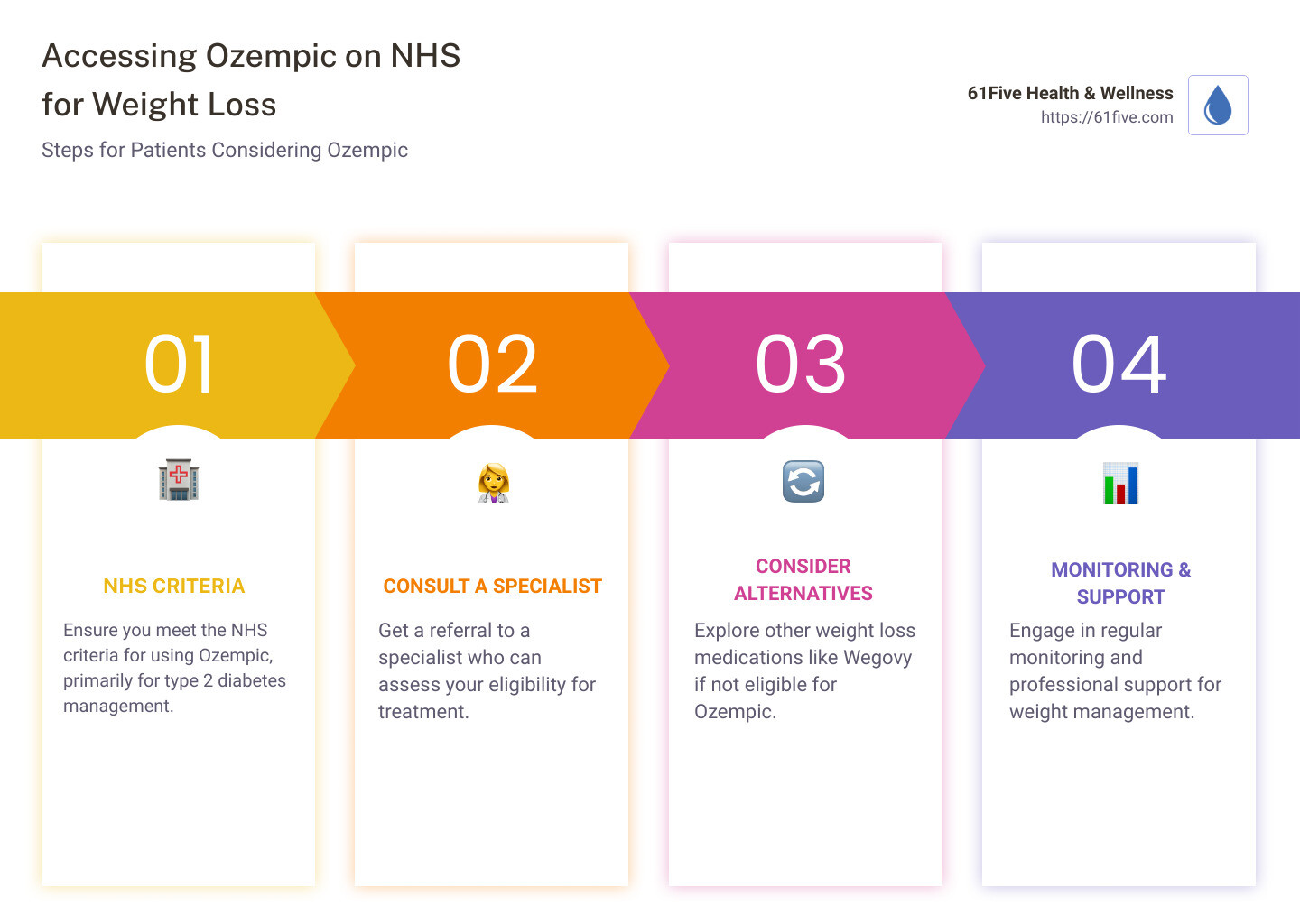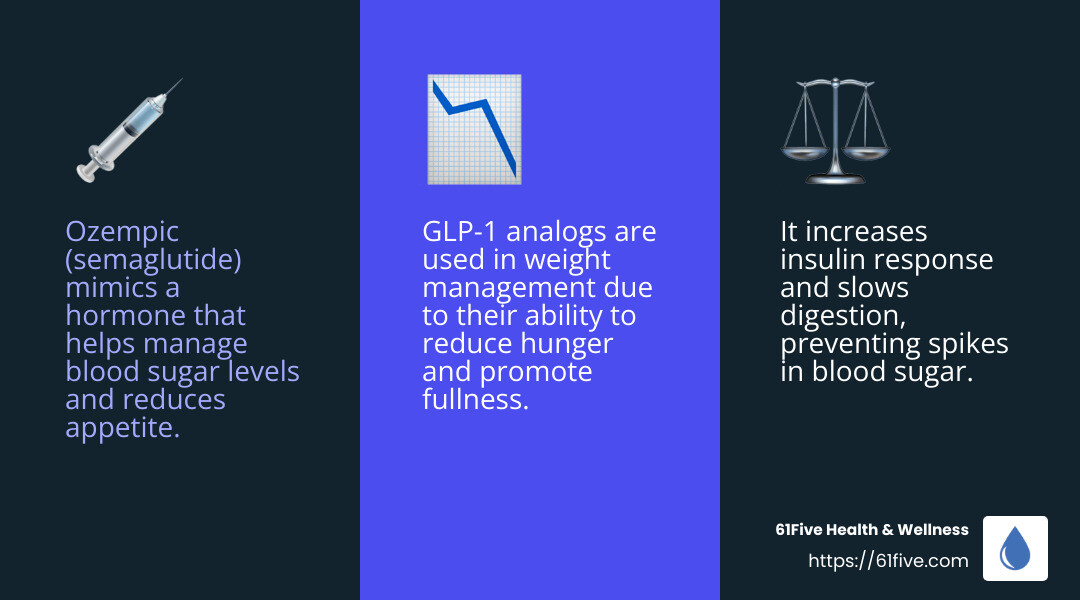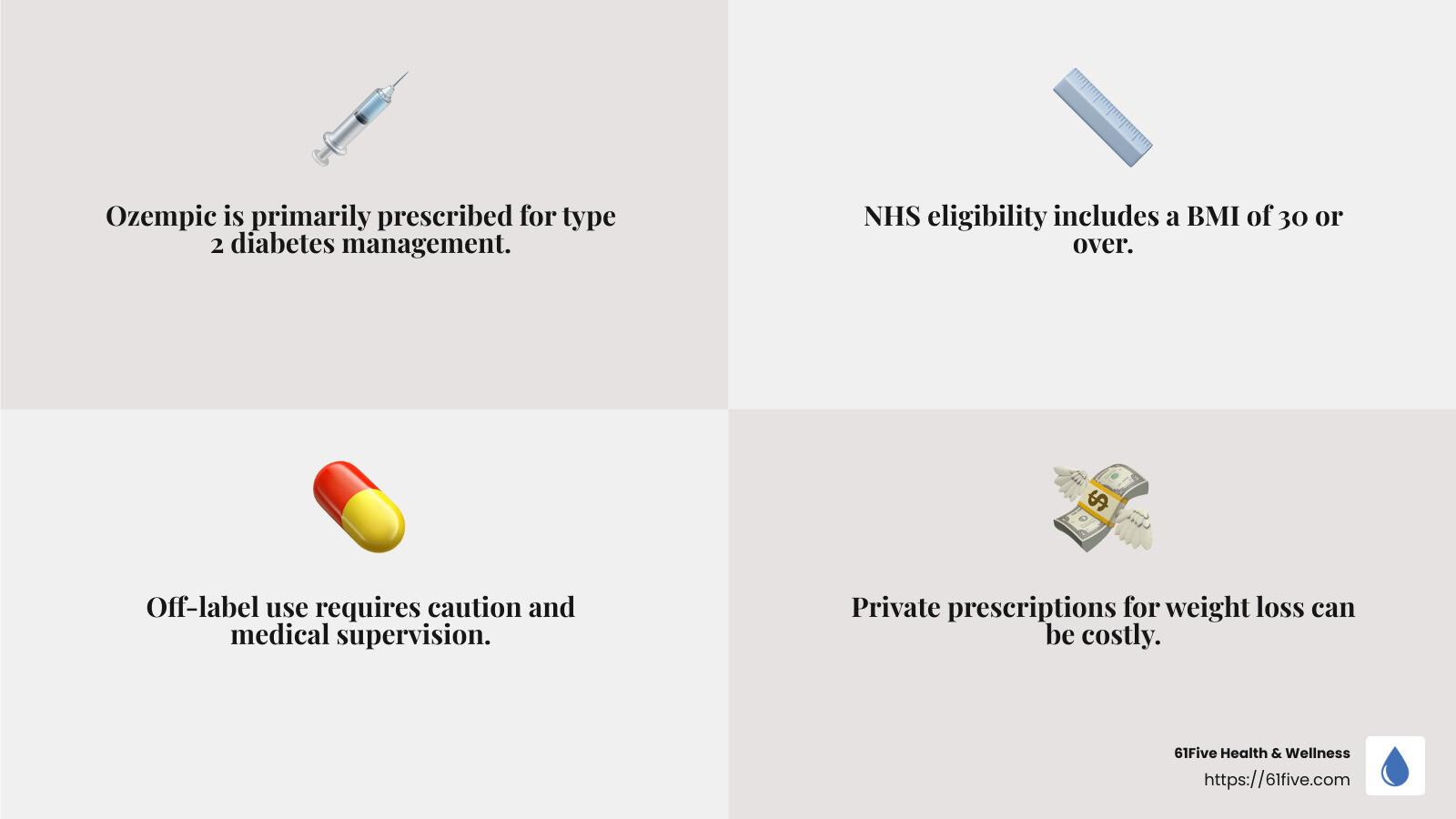Ozempic on NHS for weight loss is a topic generating a lot of interest among those seeking effective weight management options. While Ozempic is primarily prescribed for managing type 2 diabetes on the NHS, its weight loss benefits have drawn attention, often leading to questions about its availability for non-diabetic purposes. Here’s what you need to know:
- Ozempic is not typically prescribed solely for weight loss on the NHS.
- The NHS will prescribe Ozempic if you have type 2 diabetes and meet specific health criteria.
- If you are looking for a similar solution for weight loss without a diabetes diagnosis, consider exploring options available through 61Five Health & Wellness.
Ozempic works by mimicking incretin, a hormone that helps control appetite and blood sugar. People notice weight loss as a side effect when using it for diabetes, sparking curiosity about its off-label use. However, the NHS strictly follows its licensing for diabetes treatment. For those exploring options, private prescriptions or other NHS-approved treatments might be suitable alternatives.
Understanding Ozempic and Its Uses
Ozempic is a medication that has gained attention for its dual role in managing type 2 diabetes and aiding weight loss. At its core, Ozempic contains semaglutide, a compound that belongs to a class of drugs known as GLP-1 (glucagon-like peptide-1) analogs. These medications are designed to mimic a natural hormone in the body that plays a key role in regulating blood sugar levels and appetite.
Type 2 Diabetes and Ozempic
For individuals with type 2 diabetes, managing blood sugar levels is crucial. Ozempic helps by increasing the body’s insulin response and slowing down the digestion process. This means that glucose is absorbed more slowly, preventing spikes in blood sugar levels after meals. By keeping blood sugar levels stable, Ozempic helps reduce the risk of diabetes-related complications.
Semaglutide: The Active Ingredient
Semaglutide is the active ingredient in Ozempic and works by mimicking incretin, a hormone that signals the brain to reduce hunger and food intake. This effect is beneficial for individuals with diabetes, as it helps control their eating habits, aiding in better blood sugar management. Interestingly, this same mechanism of action is what also leads to weight loss, making semaglutide a popular choice for dual-purpose treatment.
GLP-1 Analogs: More Than Just Diabetes Management
GLP-1 analogs like semaglutide are not new to the medical field. They have been used for years to help manage type 2 diabetes. However, recent studies have shown their potential in weight management, leading to the development of medications specifically aimed at weight loss, such as Wegovy. These medications work by reducing appetite and promoting a feeling of fullness, which can lead to significant weight loss over time.
In summary, while Ozempic is primarily prescribed for type 2 diabetes on the NHS, its weight loss benefits have sparked interest in its use for non-diabetic purposes. However, it’s important to note that the NHS prescribes Ozempic strictly for diabetes management. For those interested in weight loss, alternatives like Wegovy are available, either privately or in limited cases through the NHS.
Ozempic on NHS for Weight Loss
When it comes to accessing Ozempic on the NHS for weight loss, understanding the eligibility criteria and the nuances of off-label use is crucial. While Ozempic is primarily prescribed for managing type 2 diabetes, its ability to aid in weight loss has garnered significant attention. However, the NHS has strict guidelines for prescribing Ozempic, and it’s important to know what these entail.
Eligibility Criteria for NHS Prescription
To qualify for an Ozempic prescription on the NHS, patients must meet specific criteria:
- Type 2 Diabetes: Primarily, Ozempic is prescribed to individuals with poorly controlled type 2 diabetes.
- BMI Requirements: Patients should have a body mass index (BMI) of 30 or over. This threshold may vary for different ethnic groups due to varying obesity classifications.
- Treatment Alternatives: Ozempic is considered when treatment with metformin is inappropriate.
- Health History: There should be no personal or family history of thyroid cancer or pancreatic issues.
Ozempic is not approved for weight loss on the NHS. For those seeking weight management, Wegovy, a medication containing the same active ingredient (semaglutide), is available under specific conditions. Patients must be part of a specialist weight management service, which requires a referral from a healthcare professional.
Off-Label Prescriptions and Considerations
Off-label prescribing refers to the practice of prescribing a drug for a purpose other than what it is officially approved for. In the UK, some individuals may seek Ozempic for weight loss through private prescriptions, despite its NHS designation for diabetes.
Considerations for Off-Label Use:
- Medical Supervision: It’s crucial to have ongoing medical supervision when using Ozempic off-label for weight loss. This includes regular health check-ups and monitoring of any side effects.
- Potential Risks: Off-label use can pose risks, such as unexpected side effects. Patients should be fully informed and understand these risks before proceeding.
- Cost Implications: Obtaining Ozempic privately for weight loss can be costly, with prices significantly higher than NHS prescriptions.
While some people manage to access Ozempic for weight loss through private means, approach this option with caution. Consulting with healthcare professionals and considering alternative approved treatments like Wegovy can provide safer and more structured weight management solutions.
In summary, while accessing Ozempic on the NHS for weight loss is not typically possible, understanding the criteria and exploring alternatives can help individuals make informed decisions about their health journey.
Exploring Weight Loss Options
When it comes to weight loss, a combination of lifestyle changes and professional support can make a big difference. Let’s explore how you can approach weight loss in a healthy and sustainable way.
Lifestyle and Wellness Approaches
Achieving weight loss isn’t just about medication—it’s about making comprehensive lifestyle changes. Here are some key strategies:
-
Dietary Guidance: Eating healthier is crucial. Focus on balanced meals with plenty of fruits, vegetables, whole grains, and lean proteins. Avoid fad diets and instead aim for long-term, sustainable eating habits.
-
Exercise Plans: Regular physical activity is a cornerstone of weight loss. Aim for a mix of cardio and strength training exercises. Even simple activities like walking or cycling can be effective.
-
Behavioral Therapy: Changing your mindset around food and exercise can help. Behavioral therapy can provide strategies to build healthy habits, manage cravings, and stay motivated.
Professional Support for Weight Management
Support from healthcare professionals can improve your weight loss journey. Here’s how they can help:
-
Personalized Plans: Healthcare providers can create custom weight loss plans that suit your individual needs and health status. This personalized approach can increase the chances of success.
-
Ongoing Monitoring: Regular check-ins with professionals help track progress and make necessary adjustments. This ensures that your plan remains effective and safe.
-
Medical Support: In some cases, medications like Ozempic or Wegovy might be part of your weight management strategy. These should always be used under medical supervision to monitor effects and manage any side effects.
By combining these lifestyle approaches with professional guidance, you can achieve a healthier weight more effectively.
Frequently Asked Questions about Ozempic on NHS for Weight Loss
Is Ozempic available on the NHS for weight loss?
Ozempic is primarily approved for the treatment of type 2 diabetes on the NHS. It helps manage blood sugar levels and supports weight loss as a secondary benefit. However, it is not approved for weight loss alone on the NHS. Due to a high demand and limited supply, Ozempic is reserved for those with poorly controlled type 2 diabetes.
For weight loss, the NHS offers a similar medication, Wegovy, but under strict eligibility criteria. This ensures that those most in need, such as patients with severe obesity and related health conditions, have access to it.
How can I get my doctor to prescribe Ozempic for weight loss?
Getting an Ozempic prescription for weight loss on the NHS is unlikely, as it is reserved for type 2 diabetes management. If you have type 2 diabetes and struggle with weight loss, discuss your medical history and current health status with your doctor. They will assess your eligibility based on NHS guidelines and consider your overall health needs.
For weight loss without diabetes, your doctor might refer you to a specialist weight management service, where you could be considered for Wegovy if you meet the necessary criteria.
What are the requirements for Ozempic for weight loss?
While Ozempic is not prescribed for weight loss on the NHS, understanding the general requirements for weight loss medications can be helpful. For drugs like Wegovy, the NHS requires:
- A BMI of over 35, or over 30 if you have weight-related health conditions such as high blood pressure or heart disease.
- A referral to a specialist weight management service, where your overall health and medical history will be evaluated.
For those from certain ethnic backgrounds, these BMI thresholds may be adjusted lower due to different health risks associated with obesity.
It’s important to consult with a healthcare professional to explore all your options and ensure any medication is part of a comprehensive weight management plan, including lifestyle changes and regular monitoring.
Conclusion
At 61Five Health & Wellness in Nashville, we understand that weight loss is a complex journey that requires a comprehensive approach. Our focus is on creating personalized wellness plans that integrate medical treatments, lifestyle changes, and ongoing support.
Comprehensive Wellness Approach
We believe in addressing weight loss from all angles. This means not just focusing on medication like Ozempic or Wegovy, but also offering support through dietary guidance, exercise plans, and behavioral therapy. Our goal is to help you build sustainable habits that support long-term weight management.
Patient Education
Education is at the heart of what we do. We empower you with the knowledge needed to make informed decisions about your health. Whether it’s understanding the eligibility criteria for NHS prescriptions or exploring alternative weight loss options, our team is here to guide you every step of the way.
By combining medical expertise with a holistic approach, we strive to make weight loss feel like second nature. If you’re ready to start your journey, learn more about our services and how we can assist you by visiting our semaglutide weight loss page.
Let us support you in open uping your weight loss potential with a plan custom to your unique needs.



